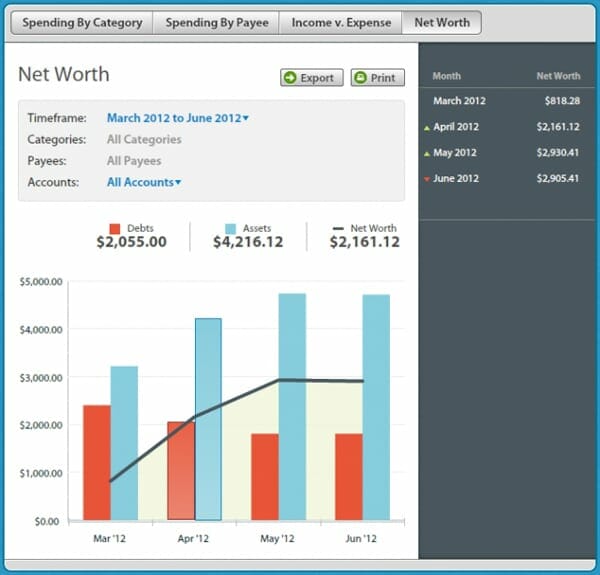Editorial Note: We earn a commission from partner links on Doughroller. Commissions do not affect our authors’ or editors’ opinions or evaluations. Learn more here.
Recently I received an email from a reader named Mike asking me about some of the tools I use. He specifically wanted to know about Empower and YNAB as tools to track your net worth.
Mike’s question gives us an opportunity to walk through how to monitor and track your net worth. In this article, we’ll cover the tools I use and how to deal with the effect of market fluctuations on your net worth.
As Mike mentioned, I use both YNAB and Empower. In fact, they are two of my favorite money tools. YNAB is an excellent budgeting tool, and Empower is my net worth and investment tracking tool of choice. Before we cover both of these tools as well as a third one, let’s start with the basics.
Why Do You Track Your Net Worth?
There’s more than one reason to prepare a net worth statement. For example, one person might prepare their personal financial statement as part of a loan application. Another person may track their financial status as a way to measure progress and stay motivated. That’s what we are focused on today.
Everybody should at a minimum track their net worth because it is THE way to measure your financial progress. Let’s use football as an analogy. Your monthly budget is the playing field. It is the blocking and tackling of everyday life. It’s what happens on the field. It is where all the action takes place.
The net worth, on the other hand, is the scoreboard. When the game is over, you look up at the scoreboard to see who won the game. Your net worth is the outcome of all those daily and weekly decisions you make that eventually add up to a lifetime of living. They all get reflected in your net worth. Hence, it’s the way to measure your financial progress over the course of each year.
How Do You Track Your Net Worth?
If you are applying for a business loan, you’ll want your net worth statement to reflect all of your assets. For purposes of measuring your financial progress, however, such detail is not necessary (and indeed unhelpful).
For assets, only include cash and those assets that over time appreciate. Assets commonly include:
- Stock and Bond Investments (retirement and taxable accounts)
- Cash
- Real Estate
- Precious Metals or Coins
- Other Collectibles
- Businesses
It’s best to exclude such things as cars, boats, and personal possessions such as furniture, clothing, personal items, and even jewelry (although it could appreciate over time).
These items are best excluded because they tend to exaggerate your financial progress. A $40,000 car may make your balance sheet appear healthier, but it will depreciate down to near zero over time. Including cars, therefore, can give a false sense of financial stability and progress.
In terms of liabilities, include everything.
Now let’s look at fluctuations in the value of assets. Both investments and real estate change in value. In rising markets, the values can rise quickly. In bad markets, the values can fall quickly. We saw this firsthand from 2007 to 2009 as the housing market crashed. How should you deal with these fluctuations?
My approach is simple. As of each date I prepare my net worth (which in my case is monthly), I mark up or down the value of assets based on their current market value. For mutual funds, ETFs, and stocks, it’s easy to obtain the market value. For real estate, I use Zillow. One cool new feature of Empower is that you can add your home as an asset and Empower will automatically pull in Zillow’s estimate of your home’s value. As for coins, there are several online resources to value a coin collection, which you can check out here.
Tools to Track Your Net Worth
I use two tools to track my net worth: Empower and an Excel spreadsheet. I use YNAB for my budget, not net worth. I’ve included it here, however, in response to Rob’s email.
1. Empower

Empower tracks your investments and updates your net worth automatically. I use Empower to track my net worth each month and it has worked pretty well for me.
Empower now also lets you track crypto if you’re investing in things like Bitcoin or Litecoin. You’ve always been able to track stocks, bonds, index funds, and even fine art, but now you can also track your cryptocurrency from the Empower dashboard.
With Empower, you can link your investment accounts so that they automatically get updated. You can also link your bank accounts, credit cards, and your mortgage. Once you’ve linked your accounts, all you need to do is log in and it will immediately update all of your accounts. For this reason, I check Empower on a regular basis. It brings in all of the investments in one place so it’s easier. Additionally, they have an app for tablets and smartphones that gives you easy access to your investments.
You can visit Empower to get more details and sign up for free.
Check It Out: Empower Review
2. YNAB

I’ve used YNAB to budget our money and track our spending in the past (although today I use Tiller). Although you can track your net worth in YNAB, I just don’t think it’s specifically designed for that purpose. That being said, it certainly is a viable tool if you want to use it to track your net worth.
Once you’ve added all of the assets you want to track and your liabilities, you can run a net worth report. It looks like this–

One note of caution. You need to update all of these accounts manually. With budgeting, I find this aspect to be helpful. It forces me to interact with my budget and spending, rather than mindlessly connecting my accounts and downloading my spending. But with my net worth, it gets a bit tedious. Still, if it works for you, use it. You can get a 34-day free trial of YNAB here.
3. Spreadsheet
Finally, I keep my investments on a spreadsheet. I followed this practice before Empower and YNAB existed. It takes 10 to 15 minutes to update it once a month. It also helps me monitor my asset allocation.
I divide my investments between retirement accounts and taxable accounts. For each, I further break down the list by sub-accounts and then individual investments. I then create a separate linked page that shows me my asset allocation. So why do I take the time to transfer to a spreadsheet when Empower already provides me? You can grab my spreadsheet template here.
There are several reasons. First, I take comfort in having control of the data. The other main reason is that I get control over how I want my investments to be allocated. With Empower, the allocation is done based on the investment. Although it is done in a very good way, there may be times when you want to allocate individual stocks and so forth in a special way that you cannot do in Empower or any other tool for that matter.
Ultimately, none of this takes a tremendous amount of time. If you add up all the time spent, maybe it would take an hour to do everything in a month. Tracking your net worth is actually motivational. If you’re trying to climb out of debt, tracking just that debt separately enables you to see your progress each month.
Learn More: The Best Stock Tracking App

